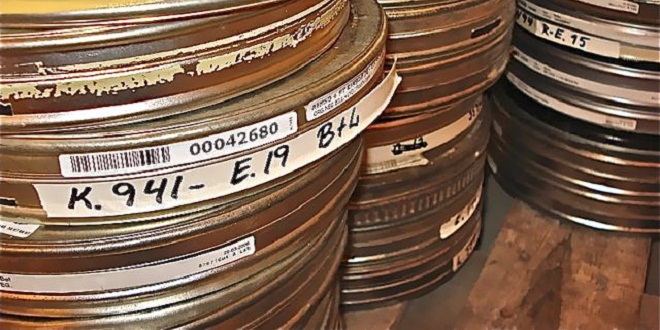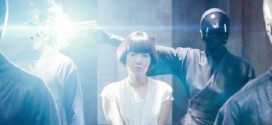Having just battled through the difficulty of writing a post about my favorite Stephen King horror adaptations, I was dismayed by several recent reviews for Cloud Atlas (2012) – the Wachowski siblings’ adaptation of David Mitchell’s best-selling novel. I have not read this novel, but I feel like I have. I mean, I am now well aware of the differences in narrative structure between the film and the novel, thanks to certain film critics who feel like it’s their duty to compare the two.
This disposition is pretty apparent in the tepid review by Slate’s film critic, Dana Stevens, who has a doctorate in comparative literature and whose first endeavor in the internet world was not film criticism. Notably, the review is entitled, “An adaptation of David Mitchell’s novel starring Tom Hanks, Tom Hanks, Tom Hanks, Tom Hanks, Tom Hanks, and Tom Hanks”, and starts as follows:
“It’s possible, if daunting, to imagine a brilliant movie that could be conjured out of David Mitchell’s 2004 novel Cloud Atlas — a film that would play with the language of cinema the way Mitchell’s nimble, tricksy book plays with the English language. … Andy and Lana Wachowski and Tom Tykwer’s adaptation of Cloud Atlas is emphatically not that movie. Where the book is sinuous and oblique, their film is galumphing and heavy-handed, its rare flights of lyricism stranded between long stretches of outright risibility.”
The rest of the review consists of a lot of criticism about the film’s narrative and observations about performances. Fair enough. But in terms of assessing the visual storytelling of a film as ambitious as Cloud Atlas, what we get is passing references to The Matrix (1999) and Blade Runner (1982) (obvious to anyone who saw the preview) and the description “floridly excessive.” Normally, I enjoy reading Stevens’ film reviews, but when she takes on adaptations of familiar books, not so much.
Next up, consider the similarly meh review of Cloud Atlas by A.O. Scott, a book critic turned film critic for the New York Times. While Scott reserves his praise for the underlying novel (“wonderous”, “graceful and virtuosic pastiche”) until later in the review, the first sentence does include a reference to Herman Melville. And eventually, he does devote a whole paragraph to the narrative differences between the book and the movie. Finally, near the end of the review, Scott concludes:
“Mr. Tykwer and the Wachowskis emphasize the spiritual rather than the political dimensions of Mr. Mitchell’s novel and at the same time make his meanings less elusive and more accessible. Perhaps too much so.“
Of course, I don’t want to focus exclusively on those film critics with backgrounds in the literary world. All you really need for a slanted review is a bibliophile. For example, critic David Edelstein entitled his review “Cloud Atlas: You’re Better Off Reading the Book”. [EDIT: As Mr. Edelstein has noted in the comments, he is not the party responsible for the title given to the review.] That’s great, Mr. Edelstein, but I am listening to a movie review, and the choice I am facing is not between spending: (a) two or three hours in a theatre; or (b) several days reading a book. Rather, I am most likely wondering whether I should see Cloud Atlas, one of the many other relatively uninspired films currently playing, or nothing at all. Now if you want to tell me whether I should devote my reading time to Mitchell’s fantasy novel versus something like Yann Martel’s Life of Pi, that’s great. But that’s another discussion.
All this leads me to the question: Do Stevens, Scott, and Edelstein ever think that the movie is superior to a book they liked? At very least, there seems to a lack of critical objectivity at play here, if not an air of snobbery (i.e., the literary being the higher form of art, of course).
In contrast, consider the negative review of Cloud Atlas by former Film Comment editor, Richard Corliss, in Time magazine. To be sure, I do not agree with Corliss about this particular movie, but his review is well-grounded in cinematic terms and speaks about the novel only in so much as it lays out the film’s narrative. And consider Roger Ebert’s review, who made only a passing reference to the novel and included the following astute observation:
“Any explanation of a work of art must be found in it, not taken to it. As a film teacher, I was always being told by students that a film by David Lynch, say, or Warner Herzog, was ‘a retelling of the life of Christ, say, or ‘Moby Dick.’ ‘ My standard reply was: Maybe it’s simply the telling of itself.”
It seems to me that if you are going to review a film (and get paid for it), then from the start, you need to take the medium seriously on its own terms. Instead of being evaluated against other films of similar style or substance, movies like Cloud Atlas tend to get bunched into a poorly-conceived genre called “adaptations” to be judged against the underlying material.
Of course, I have heard the argument that movie critics also need to speak to the fans of the books. But do they really? To echo my previous question, at the point when you have already spent days immersed in reading/listening to a book that you clearly love, how often does the two or three hour experience of watching movie match up? Not often. And the exceptions (e.g., The Shining (1980)) tend to prove the rule. Will a movie reviewer’s insistence on comparing the apples and the oranges really persuade/dissuade the gazillions of readers who gobbled up the Twilight or The Hunger Games from venturing into the next phase of the franchise? I think not. In fact, it probably does more harm than good.
I look at drawing these connections between books and movies like mixing religion with politics. Maybe I am an idealist overstating my argument. Maybe the cat is already out of the bag. Still, as I see it, not all good books make for good films, but we also live in a world where selling a lot of books and selling a lot of movie tickets is not enough. And yet, the more we talk in the public sphere as if book and films come from the same tree (i.e., as if adapations should be thought of as a distinct film genre) – the more we encourage a line of thinking where the artistic merit of both media is sacrificed to the financial pursuit of cross-marketing. Do we really want publishers to be asking themselves, “Would novel X or novel Y make a better movie?” Do we really want another dollar that could be used to produce a film from an original script sacrificed for the service of an established book franchise? Yet every time a movie reviewer uses the book as a measuring stick for the movie, he or she encourages that line of thinking.






If I have read a book, it is impossible for me not to judge a movie adaptation by the book. For that reason, if I have a choice I will not read a book before seeing a movie. The medium of novels have different kinds of details than a film. A film focuses its detail on the visual, a novel may focus more on plot or character development or dialogue and if the book decides to focus on one of these, the movie can’t keep up. This means that the scriptwriter/director must make choices as to what they will include or not include in a time frame that works best for short stories or novellas instead of full novels. And the choices made is the film will of course be different choices than I– or anyone else– would make. So to judge the movie by the book is completely unfair.
This is not to say that I haven’t appreciated some films more than the books they were adapted from. Hugo and The Children of Men are two. But the list of films that have been ruined for me because I have loved the books beforehand are too many to count: The Two Towers, The Shining, The Golden Compass, Les Miserables, The Lion, the Witch and the Wardrobe… and on and on and on. It is better for me to watch a film first and then read the book. If I already love a book, and a movie comes out, I am very hesitant to watch the film, because it is likely ruined for me already.
Thanks for the comment Steve
I am willing to concede that it is possible to appreciate both the novel and the film adaptation, but for very different reasons. (It is unlikely that one would appreciate the latter after spending so much time with the former, but it is POSSIBLE.) The problem I have is using one as a measuring stick for the other.
What does Stevens mean by saying the filmmakers should have used cinematic language in the same way as Mitchell used the English language? It sounds nice in sentiment, I suppose, but it tells the reader absolutely nothing about the film. (Should Tykwer have used more close-ups like Mitchell used one syllable verbs?). What it really says is, “I really liked this aspect of the book, and you [director) did not reproduce that experience for me in the cinema.”
I saw this on a Google Alert and since you seem earnest and intelligent, it’s worth replying to. It’s significant, though, that you took the online headline (which I didn’t write) from my Fresh Air review (N.B., I have nothing to with NPR and am not NPR’s anything; I do radio reviews for Fresh Air with Terry Gross and print reviews for New York Magazine) and didn’t seem to listen to my piece. The lead: “First I need to talk about the book because it’s not as if Cloud Atlas the movie came from nowhere—and if you think it’s only the movie you want to know about, I think you need a context for what’s onscreen.” I could hardly have been more open about what I was doing–reviewing the movie but beginning with the book. I don’t normally do that, which is why I prefaced the review the way I did. As a rule, a movie establishes its own context and lives or dies no matter how faithful or unfaithful it is to its source. But only an ignoramus (most film critics these days are ignoramuses) would refuse to turn to an esteemed novel to understand what it is that the filmmakers were responsing to and trying to translate into another medium. I would consider a critic who didn’t bother to pick up Anna Karenina but felt qualified to hold forth on the upcoming movie as too stupid to take seriously.
First, of all, I should mention that I am a big fan (listening to your reviews every week), as I am also a fan of Roger Ebert, Dana Stevens, A.O. Scott, Richard Corliss.
I apologize for the affiliation and have edited the reference to your review. I did read the review before writing the post, and I hope that the individuals who read my blog post clicked on the hyperlink to read your review for themselves. (I try to make the color conspicuous.)
Our point of disagreement (if there is one) really seems to be whether or not it is necessary or appropriate to use an original textual source (e.g., a novel, a short story, a play) as a type of measuring stick for a film or for elements of a film (e.g., characters, dialogue, etc.). In my opinion, I think it is fine to say the novel deserves a grade A as far as novels go, but the film adaptation descerves a grade C as far as movies go (alhtough one has to wonder why such a dual assessment would be necessary in a film review); but I would take exception with the statement that the movie receives a grade C [or insert any other qualitative descriptor] as compared to the book. In other words, I do not think “adaptations” should be considered, and effectively treated like, a distinct film genre to be assessed according to a different set of standards from those films that are based on “original” material.
In any event, I read about 15 or so reviews of ‘Cloud Atlas’, I could not help but notice (with exceptions of course, including Mr. Corliss’ review) that there seemed to be a direct correlation between: (1) the level of the critic’s disappointment with the film; and (2) the extent to which the critic discusses or makes reference to the book in the review. That is what prompted me to write the article.
I do appreciate your response. It is great to know that somebody you respect as a critic actually cares about what listeners say and is willing to have civil discussion about it.